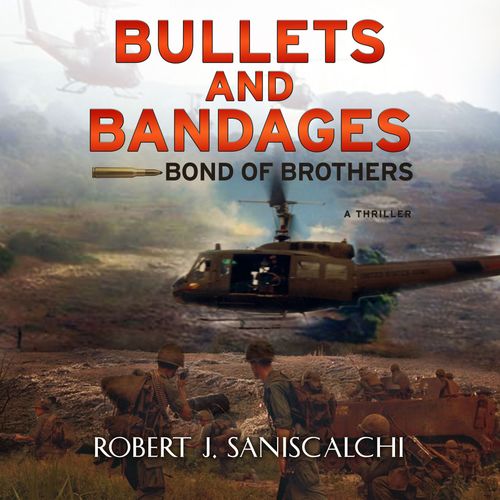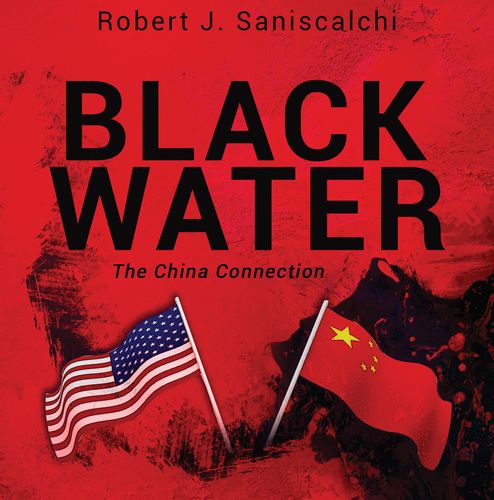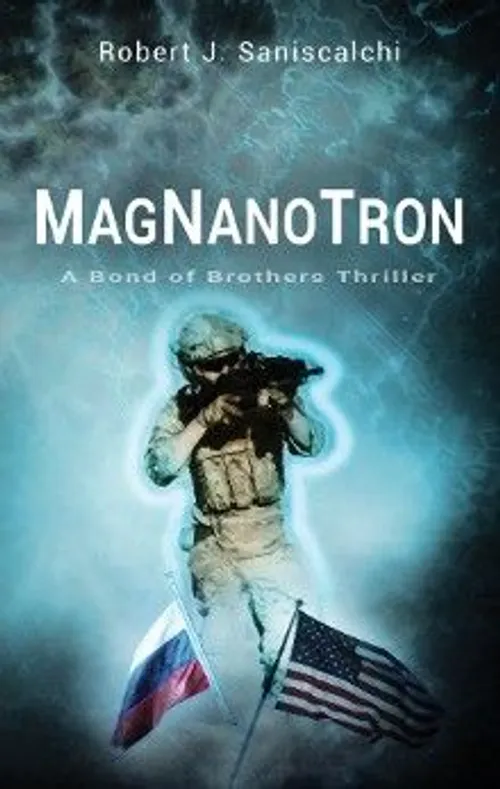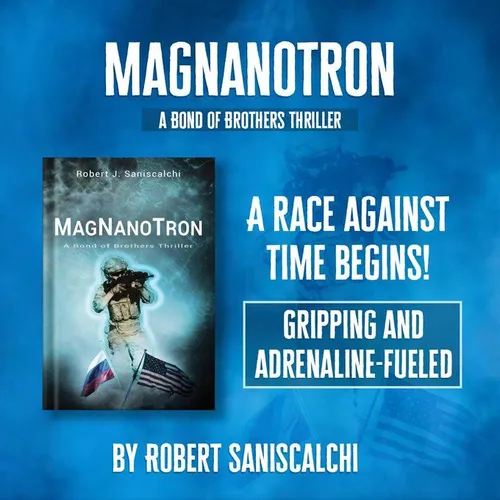Chapter 2
THE ARRIVAL
We sat together in the cool shade, as the big man carefully pulled open the carton and removed the weapon; he smiled, his eyes brightening, as he held the rifle.
It struck me that his son had the same smile, and held his own rifle in the same fashion. I could see my friend, Sergeant Green, as I now watched his father. I could feel the war again.
The big man moved closer, put his arm around my shoulders and asked: “Please, tell some about you and my son. Where ya from? When did ya join the Army? What was it like in Vietnam? Lord knows, I got me nothing but time.”
For a moment, my mind flashed back to Vietnam, to the names and faces of my comrades; I could see it all so clearly: my past, and the bullets and bandages of war.
*
I grew up in an average New Jersey neighborhood, home to hardworking, blue-collar and mostly middle-class families.
My parents, Pasquale and Bruna Marrino, are both Italian. They believed in a big family and had six children: James, Patrick, John, Rob (that’s me) and my sisters, Anne and Janet. My father worked in construction; my mother worked when she could, but she already had a full-time job, taking care of the six of us. Our job was to go to school, go to church on Sunday and stay out of trouble. We all got along, for the most part; a big, happy family.
After high school, I spent my time working at the hardware store and hanging out with my friends, Ron, Bob and Mike. These were the ‘sixties: rock‘n’roll was in and Bob had just got his car. Some weekends, we would go play some pool or take a drive down the shore; other times, we would all pile into Bob’s car and go to the drive-in movies.
One day, we were all hanging out, drinking beer and musing about what we wanted to do in the future, when Mike started talking about joining the Navy, to sail the high seas. He begged us all to go with him, to see the local recruiter.
“Are you crazy?” Ron said. “There are no girls in the Navy!”
Bob volunteered to drive, and the decision was only left with me. I agreed, but the deal was that I didn’t have to do anything - just keep him company.
The next morning, Bob dropped us off at the post office, where the recruiter was standing out front, having a smoke. I remember how grand he looked in his dress uniform.
We went into his office and sat down, while he talked - he was a smooth talker.
“The opportunities are endless for young men like you,” he said, with a smile.
That morning, Mike joined the Navy and I left the post office seriously thinking about it. I couldn’t stop thinking about the man in his uniform. Maybe I could make something of myself, after all?
When I finally drummed up enough courage to talk to my parents about joining the Navy, my dear mother almost had a heart attack. She clearly didn’t want me to go and, as usual, my sisters were on her side. My brothers seemed to be with me, but I could tell they were waiting to see what Dad had to say. My father simply sat and finished his breakfast, until all had quietened down. Then, he called me over to the table.
“Son, if that is what you really want to do, then do it - I would be very proud to see my son serve his country. But, why the Navy? If you go, join the Army, like your father did.”
I couldn’t argue with him, so I joined the U.S. Army.
*
My journey started on January 7, 1967: my first day in the Army. I was only nineteen years old, and wanted to see the world; I wanted nothing more than to get away from my small town in New Jersey. Little did I know how far away my journey would take me!
I spent almost a year training, starting with basic infantry training, at Fort Dix, New Jersey. It was tough going at first; my drill sergeant was a real stickler, who did everything by the book. But, he taught us well.
I performed best in the weapons and field training, and I qualified as an expert marksman, with the M-16 and M-14 combat rifles.
Some of us were offered the opportunity to go on to San Antonio, Texas, for medical training, whilst others got their orders: they were going to Vietnam.
I realized that my turn could be next and, for the first time, I felt scared, nervous and unsure of myself. Of course, I knew about the war, but I had never felt this way about it before. I decided to go to Texas for the additional medical training: I figured that I could at least learn something new – and, have time to calm my nerves! I had no idea how it would turn out, but I was determined to give it a try.
Once there, I actually found the training very interesting, and it kept my mind busy. It was amazing how much there was to learn, but I enjoyed it. The doctors and nurses were extremely patient with us - some had already been to Vietnam – and, working with them helped me to build my confidence back up; for now, the fear was gone. And the new skills I had gained could save lives.
Time passed quickly. When the first part of my training ended, I received my new orders, to go to Hawaii for special medical field training. From there, eventually, the unit would be deployed for a tour of duty in Vietnam - I had to accept that fact, and I tried to make the best of it. My fear of going to Vietnam reduced, as I realized that maybe I would be able to make a difference - I was, after all, going to war to help take care of my comrades.
Everyone was excited as we boarded the plane. When I was a little boy, I had dreamed of going to Hawaii – now, my dream was coming true.
Hawaii was more beautiful than I ever imagined, though the huge military complex was not far from Pearl Harbor.
The training was very intense, but I enjoyed it; we went out on training patrols almost every day. Sometimes, on our patrols, we would hike for miles into the scenic countryside, or go up into the mountains and camp out.
When we were off-duty, my buddies and I would go into town and have a few drinks, or go to the beach - I loved to swim in the warm, crystal-clear water and lie underneath the palm trees. I even learned to pick coconuts and pineapples.
The weeks turned into months and, before long, it was time to leave. I was assigned to the 21st Infantry, Bravo Company, Americal Division; I was to be part of an elite rescue and recon platoon, now on its way to war.
I had often talked with my buddies about the war. We were all scared, and none of us sure what it would be like in Vietnam. And now, here I was, about to go off to that strange place. My mind was restless, as I thought about what the future might hold. Men die in war! Good men, with skill and bravery!
I needed to clear my head and ask for God’s blessing, before going off to fight. So, before leaving, I went to the chapel and prayed. Sitting there by the altar reminded me of home - of Sundays with the family and of being in a secure place. I asked God to shelter and protect me, that I would return home safely.
*
We flew to Vietnam on January 10, 1968.
The plane was full of excited troops chattering about the adventures which could be in store for us. The man in the seat next to me didn’t have much to say, though. I could see that he was a Marine sergeant; he looked to be much older than the rest of us.
“Well, son,” he smiled, as he pointed to my medical pack, “I see you’re a new medicine man.”
I nodded and shook his strong hand, and we introduced ourselves. Then, he continued: “That’s good, son, ‘cause where we’re going, they could sure use your help. You look mighty young to be takin’ on such a big job.”
He seemed amused as he watched the troops, laughing and joking, for a while. Then, he added: “I was just like you boys on my first trip, but the ‘Nam changes you in a hurry! My boot-camp buddies and me got blown up before the first week was over.”
“What happened?” I asked.
He sipped his coffee and continued: “We were heading out from base camp, when our transport truck hit a damned mine - the blast blew us ten feet up in the air! Most of us sitting in the back were okay, just banged up pretty good, but when I came to, the guys in front were on fire. We tried to help them, but they were all burned up. Two of my buddies were killed when the damned truck landed on top of them.”
As I listened to the old Marine’s story, a nervous feeling began to creep over me; the fear was back again.
After a few quite minutes, he smiled, as he handed me a small, silver flask: “Here, have some of my medicine - you look like you could use it. Don’t worry too much; just keep your head on straight and you’ll be okay.”
My hand was shaking as I took the flask from him. The brandy in the flask went down warm and smooth, as I sat there, trying to calm down and praying for the strength to fight my fear.
“Thanks,” I said, handing the Marine back his flask.
He smiled. “Now, try to get some sleep; it’s going to be a long flight.”
I must have slept for hours. When I woke, the plane was descending.
I looked out of the window and saw, for the first time, the terrain below. The thick green jungles seemed to have a cloud of mist rising from them; the tropical countryside looked peaceful. As the plane flew lower, I could see farmers in their rice fields.
This couldn’t be so bad.
Over the jungles and on to the Da Nang Air base we continued; it was a long flight. I couldn’t wait to get my feet on the ground again. Finally, we arrived at the airfield. When I got off the plane, the heat and humidity hit me like a hammer.
There to meet us was a corporal and a handful of officers. One of the officers did a roll call and we formed up, before they proceeded to walk around, checking us over. Afterward, we were directed to move out to the transport trucks, for the ride into base. With all the gear we had to carry, it wasn’t long before I was soaking with sweat.
As I was getting settled in the truck, the corporal jumped on board and introduced himself: his name was Andy; I shook his hand.
“Welcome to the ‘Nam,” he smiled. “It’s my job to get you guys started.”
Before long, the truck was full of troops and we were moving out, the breeze in the open truck providing instant relief from the heat.
I looked around, taking in the sights as we drove along the road. The whole place felt strange - the sights, sounds and smells of the villages and jungles so foreign. The Vietnamese people looked and talked differently. Andy turned and pointed to a group of workers, out in the fields: they wore large, straw hats and what appeared to be black pajamas. I noticed that they were watching us, as we passed by.
“As you can all see,” Andy continued, “these people are from a whole other culture; for them, ours is a completely different way of life. I feel uncomfortable being around most of them. You guys, stay alert when you are out in the towns and villages: some of the Vietnamese people don’t want us here at all. Sometimes, I don’t know if they’re our friends or our enemies.”
One of the men asked: “Are the stories about the people suddenly becoming Viet Cong and ambushing our boys true?”
Andy stood up as he replied: “Soldier, you got that right. And, it seems to be growing worse all the time.”
He raised his voice as he continued: “You guys need to remember this, and remember it good: the only people you can trust is yourself and the soldiers next to you.”
I couldn’t understand it. Even though we put ourselves in great danger by protecting the civilians, they helped the V.C. Why? Did the V.C. force them to do it?
Maybe the stories were not all true; perhaps, out in the villages and hamlets, they wanted nothing more than to farm their rice and be left alone. I realized then that there was much to learn about Vietnam and its people.
I arrived at Command Central 1 in Chu Lai with my group, where we had a few weeks of orientation and equipment procurement. We sat outside one day having lunch and I noticed the air was a little cooler with a light breeze coming from the nearby sea
Most importantly, I got to know the forty-eight soldiers assigned to my platoon. They were from all over the U.S.A., and there were even a couple of guys from New Jersey.
Command Central 1 was a huge complex, with an airfield, Army headquarters and a hospital combined. Our barracks was one of the hundred or more corrugated buildings, behind the huge headquarters building.
Our team leader, Sergeant Jakes, would make the wake-up call, early every morning. It reminded me of boot camp, the way he came in yelling and turning on the lights. One morning, he caught me trying to stay cozy under the covers, and yanked them off, screaming at me: “Private Marrino!! Get your butt up and give me twenty, now!” The other guys seemed to be enjoying the scene, as he chewed me out. That was the last time I was late getting up.
I usually sat with the same group every day, for chow. We would each tell our stories of how we had ended up in Vietnam: most of the guys were drafted, or joined to get out of trouble at home.
Sam, also from Jersey, asked me: “So, Rob, why are you here?”
I looked at him with a straight face and answered: “You know, Sam, I really don’t know. Can I go home now?” We both laughed, and it helped ease the tension. We chatted for the next hour.
Later that night, I saw Sam reading a newspaper at his bunk. I said to him: “Sam, I know I was joking earlier, but sometimes I really do feel like going home.”
“Listen up, Rob,” Sam replied: “I know why you’re here.”
I waited for the answer, as he lit his cigarette.
“Because we need a Doc, and you’re the man for the job,” he smiled.
“Thanks, Sam,” I replied. “It’s good to have a friend here.”
That night, after duty, a few of us sat outside, by the tree line. I liked watching the stars, when it was a clear night; the moon was so big and bright, it seemed little higher than the treetops.
Sam and a few of the guys came over, carrying a load of booze; “Hey, Rob, look what we found. Everybody needs to chip in five bucks, so I can take care of my man at supply chain.”
Then, cracking it open, Sam raised his beer: “A toast to Rob, our new Doc. We’re lucky to have him.”
That was the first of several toasts that night, as we proceeded to finish all of the beer and whiskey.
The next morning, I found myself lying on the floor next to my bunk, with a killer of headache. I needed black coffee and aspirin, desperately.
Some nights, when I didn’t have duty, I would join in one of the card games, where we would talk about girls, friends and family.
One night, I was on guard duty at the front gate. I was on a sandbagged platform, which overlooked the front of the camp perimeter, and nearby there was an M-60 machine-gun set up on a tripod, field glasses and a radio, to report any enemy movement. I could see the other guard in his platform, on the other side of the front perimeter. The night was cool, and very dark and cloudy, with no sight of moon or stars. Most of the base was in darkness, other than lights set up for security, around the camp’s perimeter. It felt strange being alone out there, and I made sure the big gun was loaded and ready. The long hours dragged on and on; it was difficult to stay awake.
Suddenly, I was jolted awake, by the sound of explosions in the distance. I looked out and saw flashes of light, and heard the muffled explosions of artillery in the distance.
That feeling of fear overcame me again, as the noise faded. I looked out into the darkness, wondering if the enemy was out there, watching me.
The call on the radio snapped me out of it. It was time to report back to base; my relief was on the way.
*
The next morning we had a meeting, and were given an outline of the upcoming mission objectives. The bad news was that Sam and a few other guys were being transferred to another unit, which needed troops.
Our platoon consisted of three fire-teams, of sixteen men each – mine was R-Team, with Sergeant Jakes in charge. Next to our lieutenant, Sergeant Jakes was second in command for the entire platoon. We were to support any of the troops in our sector, mostly South Vietnam’s ARVN and other US Army and Marine units. Sergeant Jakes was an older dude, but he had an air of toughness and confidence about him.
He looked us over, before suddenly grabbing a backpack off of a soldier, who walked past me; “What the hell you got in there, Private Yavik?”
Jakes had all of the team’s attention, as he started emptying the pack on the floor. “Will you look at all this junk? You won’t need half of it, Private! Charlie could hear you clanking through the jungle, a mile away.
“Pay attention to this, all of you: we will all learn to pack light and right. Believe me, you will thank me later, when you’re out in the bush.”
I knew I had many things to learn and I respected the Sarge: he had combat experience.
After the meeting, I went and found Sam, who was packing his gear. We shook hands, to see each other off, and he said:
“Listen, Rob: you’re the man for the job - remember that.”
I replied: “Thanks, Sam. You’re a good man; I’m sorry to see you go. Write me when you get a chance.”
I prayed to see him again, as he jumped on the truck for his ride out.
As I was repacking my gear, I noticed a big, burly-looking black man, talking to Sarge - I hadn’t seen the guy before, but Sarge seemed to know him. He looked in my direction, as he walked past me. Then, he stopped and turned back. He extended his huge hand.
“Well, I see we got us a new Doc. I’m Corporal Clarence Green.” He had a big smile, as we shook hands. “Most folks call me Green.”
“Glad to meet you, Green. Rob Marrino is the name.”
Green smiled, “You mind if I call you Doc?”
We sat and talked for a while. He told me this was his second tour. I liked Green: he seemed honest and down to Earth; his questions had a way of cutting right to the chase.
“So, Doc, how do you like the U.S. Army?”
A simple question, but it took me a moment to find the answer: “For me, Green, being in the Army is not really much different to working for a big company: there are some people you like and others you learn to avoid. I met a few guys who were so dumb it was a wonder they made it through boot camp.”
Green added: “Yeah, like in a big company, there are the officers with no common sense; no experience. They be more concerned about their own self and how they could look good. Wait ‘til you meet our Captain Brooks - he is a piece of work!”
Green told me the story of his old captain, and it seemed that he was just like our own Captain Brooks, whom I had yet to meet: in command of a company, which contained several platoons, like ours.
Green told me: “Vietnam is the wrong place for people like him: it takes advantage of their weaknesses. Fortunately, he didn’t get too many people killed before he went down.”
Later that day, I did meet with Captain Brooks, and Green sure was right about him.
I also got to know our platoon leader, Lieutenant Fellows, and I learned that he was the captain’s “yes man”. He never spent much time with us alone, usually being with Captain Brooks. For an officer, Fellows didn’t seem to have much confidence or experience, so we ignored most of his comments, whenever possible.
On the other hand, though, our team had Sergeant Jakes, and we needed to learn from him, if we were to survive the coming war. He had the experience of a previous tour behind him, and we all saw that he knew how to make it out there. He seemed very serious about the team and what we needed to do on patrol. I knew, after a few days on patrol, along with Corporal Green, he would be the one calling the shots.
Out in the bush, our team consisted of sixteen men, mostly privates. Like me, they were mostly new, and eager to learn and follow the sergeant’s lead. Yet, to my surprise, the men seemed to look up to me; I guessed being the medic had some benefits.
One day, we were cleaning our weapons and gear. I always seemed to have a hard time when it came to cleaning my M-16, but Sarge was a real stickler on cleaning and preparing. He came straight over to me and checked my rifle.
“Doc! It seems that you still can’t clean your weapon properly. Do you have a problem?”
“No, sir!” I replied. “I just forgot to check it today; I was busy at the hospital.”
His face tightened, as he continued: “Just because you’re a medic does not excuse you from having a clean weapon - do you read me, Private Marrino?”
I could feel my hands shaking, as I saw the anger in his cold, steely eyes. He grabbed Green’s rifle: “Now, this is a clean weapon. Good job, Corporal Green, and thanks for volunteering,”
Green jumped to his feet. “Volunteering for what, sir?”
Sarge smiled: “To help the Doc out with his problem.”
Sarge continued checking the group. “Well, it looks like some of you guys are learning - good for you. Now, I want all of you to teach each other how to clean and use all of the weapons. In a firefight, you could jam your weapon, and the enemy doesn’t care, ‘cause he is trying to kill you. So, you’d better be able to find another and use it.”
I sat there, feeling a little sorry for myself, as the rest of the guys started exchanging weapons. Green came over to me. “Here, Doc, take my shotgun. It’s a Remington: so darn easy to clean, my grandma could do it. Don’t go a-worrying about what Sarge did to you - it’s just his way, is all. Now, let me see that weapon of yours; I’m gonna get you to clean it right with your eyes closed.”
I handed him my M-16, as I replied: “I could use a little help; I can shoot it much better than I can clean it. You don’t mind?”
He smiled, as he started to strip the weapon down. “You know, Doc, we in this thing together; may come a time when you be helping me.”
“You’re right, my man. Thanks,” I replied. “As the old saying goes: ‘one hand washes the other’.”
During the next few days, Green and I became friends. We talked some about home. He was from a small country town, in Alabama, where his family had a farm. He married right after his first tour, and his wife now worked on the farm, helping the family. I wanted to ask him why he came back to the ‘Nam again, but decided that it could wait. With his help, I learned to strip and clean every weapon in the group.
One morning, as Green and I were heading for chow, a platoon was coming in from the bush; they walked right by us. They wore dirty, torn uniforms and looked like bears had mauled them. A few of the men were wounded; one soldier had bloody bandages on his face and arms.
I was standing there watching them, with Green, who said: “Good Lord, Doc; they sure been in some kinda fight.”
“You got that right,” I replied.
I could see anger in the grim faces, as they walked by. Some of them seemed to have a strange, blank look in their eyes, as if they didn’t even notice us. For me, it was shocking; like a wake-up call, to the reality of the war. I felt truly sorry for them.
Their sergeant approached us; “Well, I can see that you guys are new. Don’t you worry: it’ll be your turn soon. We’ve been out on recon for weeks, and I lost six of my men to those V.C. bastards! We’ll get even next time! Watch your backs, boys: they’re out there.”
As I listened to his words, my right hand started shaking, and I became jumpy and nervous. Our whole group was quiet for some time afterward - this war was real, and our men were dying out there.
I tried to calm myself and started working on cleaning my rifle. Green told me that I was lucky: my rifle was an updated model M-16; the older ones jammed.
That night, I prayed for those men who walked into camp, and for our own lives.








This story has not been rated yet. Login to review this story.